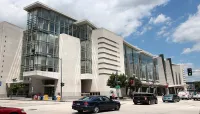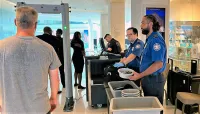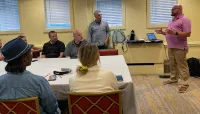 Ronald Reagan Washington National Airport Lead TSA Officer Angel Negron-Estela (middle) and Baltimore/Washington International Thurgood Marshall Airport TSA Officer Matthew Rudd screen bags at the Freedom Plaza. (Albert Stallcup photo)
Ronald Reagan Washington National Airport Lead TSA Officer Angel Negron-Estela (middle) and Baltimore/Washington International Thurgood Marshall Airport TSA Officer Matthew Rudd screen bags at the Freedom Plaza. (Albert Stallcup photo)
Leaders from around the world converged on Washington, D.C. last week to make key decisions on how to protect dozens of nations, and TSA played a significant role in the milestone event.
For just the fourth time in the 75-year history of the North Atlantic Treaty Organization (NATO), the U.S. hosted the annual NATO Summit, with 32 NATO allies meeting at D.C.’s Walter E. Washington Convention Center.
TSA partnered with the U.S. Secret Service to provide security at numerous venues in the nation’s capital. The Secret Service took the lead in designing and implementing the operational security plan for the summit, which Department of Homeland Security Secretary Alejandro Mayorkas designated a National Special Security Event (NSSE).
“An NSSE is an event of national significance that is deemed to be a potential terrorist target requiring the counterterrorism capabilities of the federal government,” explained Supervisory Federal Air Marshal Mariana Reed, TSA’s special events coordinator. “The federal government has the lead during these events, and state and local governments augment with support.”
Reed said TSA hosted Secret Service representatives and partner agencies throughout the NATO Summit at a coordination center set up at TSA’s Freedom Center in Herndon, Virginia, just west of D.C.
“The coordination center was the primary operations center, which was staffed by essential representatives from participating law enforcement agencies, public safety departments and other key organizations that had distinctive roles in the implementation of security plans,” said Reed, who served as the coordination center’s co-chair during the summit. “The primary purpose of the coordination center was to provide the timely dissemination of information to all participating security operations entities.”
The Freedom Center was also the designated around-the-clock Airspace Security Operations Center for the summit, with TSA and seven other federal agencies partnering to monitor the restricted airspace around the nation’s capital.
TSA also supported the summit’s security mission with 37 transportation security officers (TSOs) who screened individuals around the convention center.
“Of the 37 TSOs, 29 were national deployment officers from the Presidential Campaign Support Team (PCST), and eight were sourced from the National Capital Region – Baltimore/Washington International Thurgood Marshall Airport and Ronald Reagan Washington National Airport,” said Alex McAuliffe, TSA’s director of Specialized Programs and Deployment. “Two TSA managers were on-site to handle logistics and support the Secret Service Coordination Center.”
National Deployment Office Area Coordinator George Dechon said the deployed team enhanced security at several summit entry points with specialized screening for guests and their property.
“All of the participating National Deployment Force (NDF) officers were keen to do their part, to be vigilant and to help guard against an array of potential threats to the summit, especially given the presence of so many world leaders, dignitaries and their delegations,” said Dechon.
Karen Guidry, Kristen Kopczynski and Michael McClellan were among the 37 TSA officers from around the country deployed to D.C. for the NATO Summit and had these thoughts about participating in this special event:
“It was amazing working with the other federal agencies and getting to know the different processes,” said Guidry, a 12-year TSO from New Orleans and a seven-year member of the National Deployment Force (NDF). “The teamwork I experienced while working with the U.S. Secret Service was humbling and something that I will look back on fondly.”
Kopczynski, a lead officer from Chicago O’Hare, joined the NDF over three years ago and said, “I absolutely love meeting new people. Everyone has a different personality and being able to find common ground among those I may not have ever met is something magical to me. It really does feel like a big family.”
“I joined the NDF team to broaden my leadership skills and enhance my ability to lead unknown situations that arise,” added McClellan, a supervisory officer from Orlando International Airport who joined TSA in its infancy in September 2002. “I volunteered for the PCST team as it gives me an opportunity to work with other government agencies and support the mission. I believe this experience so far has elevated me to be a better leader.”
As the lead agency in charge of security at the NATO Summit, McAuliffe said the Secret Service determined the need for TSA’s support, which TSA Administrator David Pekoske approved.
“TSA has a long-standing relationship with the Secret Service, and they look to our frontline workforce for their expertise in screening and threat detection,” McAuliffe noted.
Reed said over the three-day summit, TSA also deployed Federal Air Marshals to provide inflight security for passenger aircraft traveling in and out of the National Capital Region.
“There were also Visible Intermodal Prevention and Response operations at commercial/general aviation airports, highways, freight rail and mass transit venues during the National Special Security Event,” added Reed.
Dechon said planning for the NATO Summit was “long in the making,” at least a year, and it took a total team effort by TSA and the agency’s many partners to make the event’s security operations a big success.
By Don Wagner, TSA Strategic Communications & Public Affairs



